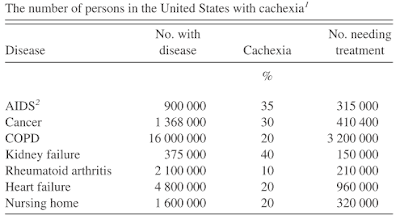After doing some research on this subject, I decided to prepare a table that highlights the difference between these very different situations.
| Starvation | Cachexia | |
|---|---|---|
| Definition | The state of being hungry when no food is available. | Loss of body mass that cannot be reversed nutritionally. |
| Feeling "hungry" | Yes | No |
| Resting metabolism | Decreased | Increased |
| Food intake | None | Low to normal |
| Reversable with nutrition | Yes | No |
| Presence of pathology | No | Yes |
When we think about “cachexia,” we often automatically think of patients with cancer, however, here is some surprising data from an article by Morley et al. (2006) showing the incidence of cachexia in the United States among disease categories. Cancer is actually very close to the bottom of the list with COPD and heart failure having the highest number of cases.
Finally, a dated yet seminal article by Brennan (1977) gives a very vivid example of weight loss in cachexia in a case where maximal intravenous nutritional support of up to 4000 calories failed to reverse a patient’s catabolic state.
Feel free to leave your thoughts for discussion. This is a difficult issue that we encounter often. I have found that an understanding of the pathology and the limitations of our medical technologies is fundamental in helping patients and families find peace and hope in realistic goals and expectations.
References
Morley, J.E., D.R. Thomas, and M.M.G. Wilson. "Cachexia: Pathophysiology and Clinical Relevance." The American Journal of Clinical Nutrition 83, 4 (2006): 735.Brennan, M F. "Uncomplicated Starvation Versus Cancer Cachexia." Cancer Research 37, 7-2 (1977): 2359-2364.


I have also found that sometimes patients with cachexia will say that they are "hungry" but they do not have the intense sense of suffering that is as found in starvation. Family members that provide food are usually surprised that the patient may refuse to eat when the requested food arrives or the patient will only take one or two bites and stop eating.
ReplyDeleteIf you are going to use my article, please give me credit by linking back to this blog post! Thank you.
ReplyDelete